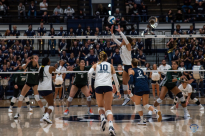Pavlik’s coaching style has evolved
He stands with his arms folded and a whistle in his mouth, watching his players in a frenzy running to serve the ball back and forth over the net.
The drill continues and he begins to slowly pace along the net, now with his hands on top of his head, the whistle chirping when the ball hits the floor, a signal to keep playing.
The drill stops when he likes what he sees. The players are gasping and holding their hands on their hips. It has been another long practice, but the work will pay off.
After all, Mark Pavlik knows volleyball and he knows what it takes to win. Pavlik, 52, is in his 18th season as head coach of the men’s volleyball program at Penn State. His career includes a NCAA National Championship, three Eastern Intercollegiate Volleyball Association Coach of the Year awards and one National Coach of the Year award.
The success has continued this year as the seventh-ranked Nittany Lions have a 20-5 record and captured their 28th EIVA regular season title. The team will host the EIVA Championship April 26-28 at Rec Hall.
But while the success is the same, Pavlik’s coaching style has evolved. As he’s gotten older, Pavlik understands better what he can and can’t do with his players. Rather than try to impart his coaching acumen all the time, he said he tries to listen more to his players and get their feedback.
Pavlik’s wife, who is also a volleyball coach, often asks him “What puts points on your scoreboard?” meaning, what needs to be said to players at a certain time and what can wait.
“I listen to them a lot more,” said Pavlik. “I think I’ve determined what’s important and what isn’t important.”
Inside his Rec Hall office, the evidence of success is everywhere. Three Final Four banners from 2006, 2007 and 2011 hang on the right side of the room. Framed copies of Volleyball Magazine with his picture on the cover are scattered on the walls including one copy signed by every player on the 2008 national championship squad.
Personal pictures line the wall behind his desk and one in particular is important to Pavlik. It shows him with two of his mentors: his former high school coach, Rich Schall, and former Juniata men’s and women’s coach Larry Bock on the night Bock won his 400th game. They are two friends and two mentors who helped teach Pavlik how to become the coach is he is today.
Yet all these trophies, pictures and memories almost never happened.
Coaching Carousel
Pavlik enrolled at Penn State as an engineering major and while at Penn State he played setter on the volleyball team. After graduating in 1982, Pavlik worked for Murata Erie, an electronics-manufacturing firm in Carlisle that produced ceramic capacitors.
Volleyball was essentially finished.
Then one day he received a phone call from Schall who asked Pavlik if he was interested in helping coach volleyball tournaments at Derry on weekends. Schall had introduced Pavlik to volleyball after he noticed Pavlik excelling in an intramural basketball game at Derry Area High School when Pavlik was a sophomore.
He told Pavlik that he had quick feet and good hands and recommended he try out for the team. Pavlik agreed to work with Schall and make the 200-mile drive every weekend back to Derry to help coach.
During his high school career, Pavlik became acquainted with the Central York club volleyball coaches through Schall. In 1985, he agreed to help them coach the under-17 boys club volleyball team so he could be closer to where he worked in Carlisle.
During the time with Central York, he traveled with the club to many tournaments. After arriving at Harrisburg International Airport from a fourth-place finish at the USA Junior National Championships in Minneapolis, Pavlik was walking to his car when it hit him.
“Why don’t you do this for a living?”
A year later, Pavlik enrolled at Indiana University of Pennsylvania to be certified to teach math and physics in high school as well as coach volleyball. While at IUP, he became acquainted with the women’s volleyball coach and volunteered to help assist with the team.
Pavlik returned to Penn State in 1988 for the annual volleyball alumni match where he was introduced by his former coach Tom Tait to Tom Peterson. Peterson had recently succeeded Tait as head volleyball coach, and as it just so happened, he needed an assistant coach.
One thing lead to another and before he knew it, Pavlik was an assistant to Peterson at Penn State. The salary was only $7,000 a year, a far cry from the $27,000 he was making in 1986 as an engineer.
Yet, the pay cut didn’t bother him. He had a good financial support system with his family. “I was bankrolled by the first national bank of grandma,” Pavlik said with a smile.
With the blessing of Peterson, for an additional $1,000 a year he also spent five years as an assistant to Bock at Juniata College. Bock had recruited Pavlik’s sister a few years earlier and spent time around the York club teams so Pavlik knew him well.
Pavlik juggled the two jobs, coaching at Penn State in the mornings and driving to Juniata to coach in the afternoons.
After assisting Peterson for five seasons, including the program’s first national championship in 1994, Pavlik took over the Penn State team in 1995. It’s been all uphill since then as he’s compiled a 427-123 record; good for a 78 percent career winning percentage.
Always Listening
Despite his success, “Pav” as he is known by everyone around him, always keeps the same easygoing demeanor.
During game Pavlik doesn’t over coach. He sits on the sideline calmly with his legs crossed and arms folded. If the team is struggling, he calls a timeouts. Rather than giving his players an earful, he’ll briefly step into the huddle, say a few words and step away to leave the players to gether their thoughts.
Much of the time, he delegates to his assistant coaches, Jay Hosack and Colin McMillan, and gives them the opportunity to instruct the players where they see fit.
“He’s very good about taking our input, asking for our input and allowing you to grow as a coach,” McMillan said. “He’s not trying to micromanage; he’s letting us do our job.”
Fifth-year seniors Edgardo Goas and Joe Sunder are the longest members of the team and serve as the team captains this season.
At the beginning of practice each day, the 17 players split into groups to practice a simple “pepper” drill where players practice hitting and digging the ball to one another. As the sound of balls bouncing echoes around the gym, Pavlik calmly strolls with his hands in his pockets -- occasionally dodging a volleyball -- to each player on the team, gives them a pat on the back and asks them how their day is going.
This genuine interest and compassion sets Pavlik apart from other coaches, Goas said.
“He knows what his players need and how they’re feeling,” Goas said. “There’s not that many coaches that go to every player before practice and see how they’re feeling.”
Sunder said it’s been a great experience to play for Pavlik the past four seasons. “He has a way of being on you, and getting under your skin a little bit, but then he’s always a nice guy and has a short memory about any mistakes you make,” Sunder said.
However, it’s not just the players who Pavlik takes time out to greet every day. Whether it’s the student-manager, training staff or reporters, he wants to know how everyone is doing.
When talking to the student trainers, Pavlik always makes sure they’ve made a good batch of Gatorade for that day’s practice. One of his many daily routines is sampling the Gatorade mixture and if it’s not too his liking, he’ll playfully let them know about it.
“Who’s taking responsibility for the Gatorade today?” Pavlik asks the three trainers during practice as he heads towards the cooler.
As Pavlik takes a drink of the grape-flavored concoction, he gives the thumbs.
“Oh yeah,” he says. “You’re becoming my master brewers.”
When his eyes aren’t watching his team on the volleyball court, they are usually fixated on his Kindle Fire that he recently got as a Christmas gift from his wife. Whenever the team hits the road for a seven or eight-hour bus trip, Pavlik says his kindle is on from the moment he gets on the bus, until the team arrives at its destination.
Pavlik, who is an avid reader, has been a member of the Book-of-the-Month club since his sophomore year in college. His reading selections have no limits, whether he’s unleashing his inner geek with a Marvel comic book, or getting lost in a Stephen King mystery. If it’s interesting, Pavlik will read it.
On his Kindle currently is King’s latest book, 11/22/63, which he recently finished. He’s excited to begin reading The Girl With the Dragon Tatoo series which is next on his list of books to read.
If he’s not reading, he’s spending time at home with his 10-year-old son Jack and his wife of 14 years, Heather, who succeeded Bock as the head women’s volleyball coach at Juniata this year.
Success not Surprising
Pavlik credits Bock as the one who showed him how to understand his players better and understand them from a student and athlete perspective.
“I think that was a great example for me to make sure I understood what the guys were going through so I could understand their needs a little better and reach them at various points of the year,” Pavlik said.
Likewise, Bock, now the women’s volleyball coach at the United States Naval Academy, is not surprised at how successful Pavlik has been. Bock said Pavlik’s teams are always going to be on the cutting edge of everything they do because of his intelligence.
“Completely, totally, expected it,” said Bock in a telephone interview. “He’s way beyond most of us coaching mortals in how he thinks his way through relationships, developing teams and all the technical, tactical stuff.”
“There’s just no surprises that he’s always been involved with successful, championship-caliber teams. He’s a really good man, who’s also a really good coach.”
When he looks back at what he’s accomplished in his career so far, Pavlik has no regrets other than not getting into coaching sooner and said he wishes he followed his heart rather than his wallet.
Pavlik doesn’t see himself slowing down anytime soon. He loves working on a college campus where he gets to see the faces of students every.
“This is just a great place to be,” Pavlik said. “Every year, there’s a freshness about a college campus that’s so full of hope and energy. That never changes. Every year it’s like that.”
He says he doesn’t have anything left to accomplish in his career other than continuing to make a difference in his players’ lives and enforcing the idea that their collegiate experience is just a starting point for them in their lives.
“Hopefully, we make differences in here with our guys that maybe aren’t evident to them immediately,” Pavlik said, “but four, five, fifteen years down the road, they’ll look back on this experience and say, ‘It was well worth it.’”
(This story was written for Comm 462 Feature Writing.)







